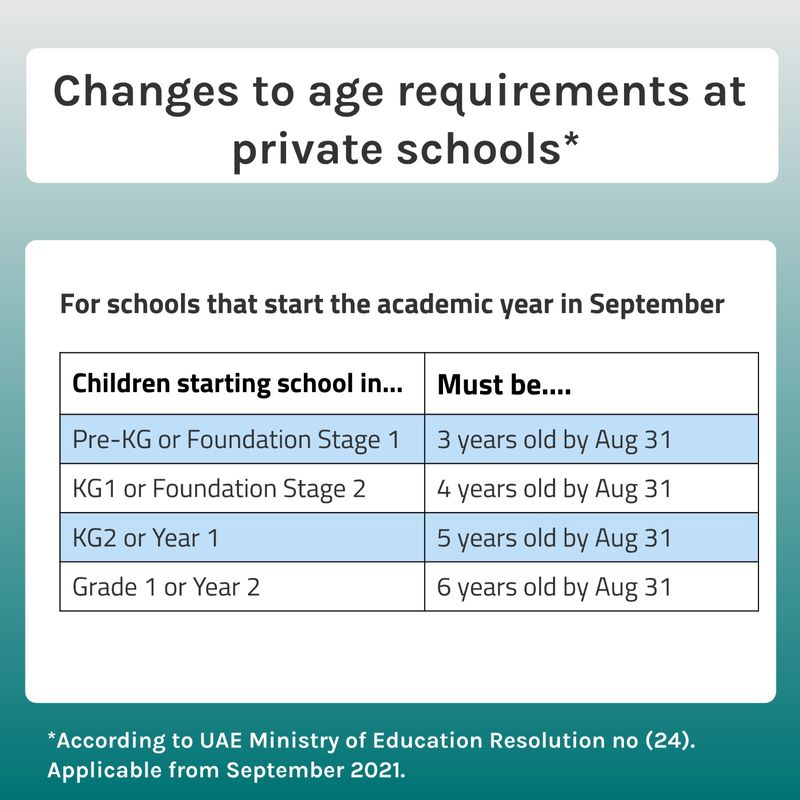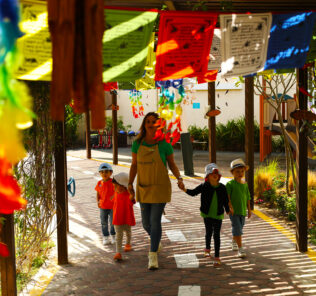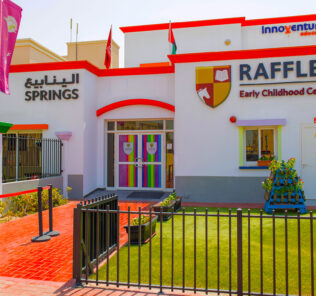Is three years of age too young for a child to start ‘big school’? Not in Dubai, where fierce competition for school places has traditionally meant expat parents sending their children to school at the earliest available opportunity – sometimes signing them up to competitive admissions waiting lists before they’ve even been born.
But there are signs that the tides could be turning.
Newly released KHDA data reveals that more than one third (34%) of Dubai parents are choosing to keep their 3-4-year-olds in an Early Childhood Centre (ECC) like a nursery, rather than sending them to school for FS1 (the equivalent of pre-KG).
This figure is surprising because it represents only a 2% drop from the number of Dubai parents who send their 2-3-year-old children to an ECC (the most popular age range for ECCs), suggesting that most nurseries and kindergartens retain their students even after they reach an age when they are eligible to attend school.
Could this signal the beginning of a shift in Dubai’s education landscape? And what is the difference between an early years education in an ECC or school environment anyway?
SchoolsCompared spoke to experts at Jumeirah International Nurseries and Early Childhood Centres, Future International Nursery, Green Grass Nursery, British Orchard Nursery, Horizon English School, Victory Heights Primary School and The English College for their view and to find out more…
Why do children start school so young in the UAE?
While formal school education doesn’t usually start until age 5 in countries like England, 6 in France and Germany, and 7 in the highly regarded Scandinavian system, it’s very common for UAE expat families to send their 3-year-olds to ‘big school’ for their early-years education – with many all-through and primary schools offering dedicated early-years departments from FS1 or pre-KG (age 3-4 years) upwards for exactly this purpose.
This is not because there is any requirement on behalf of the UAE for children to start school so young; rather, compulsory education in the UAE only begins from Year 1 (or Grade 1; the academic year that your child turns six).
But it has become common for children to attend ‘big school’ at a younger age due to variety of factors – not least a history of extreme competition for school places in the UAE. With limited numbers of schools, parents would sign their children up at the earliest opportunity, since a spot in FS1 (pre-KG) would automatically guarantee them a place in FS2 (KG-1) and Year 1 (Grade 1) at the same school. In addition, many of the expat salary packages that include children’s school fees are only eligible for use in schools and cannot be used in nurseries or other ECCs.
However, Dubai’s education landscape now looks very different to how it appeared even 5 – 10 years ago. There have been 68 new schools opened in Dubai between 2011 and 2022, all of which offer a breadth of curricula and a quality education for children, so parents have far more choice. Meanwhile, those generous expat packages that used to include school fees are becoming increasingly rare.
The KHDA data
Although there is a common perception that ECCs suddenly empty out the minute that children turn 3 and become eligible to attend school, the KHDA data suggests this is not the case, and that the FS1/ pre-KG years at nurseries and ECCs are more thriving than ever.
ECC-Landscape-Report-EnThis is the first time the KHDA has released this sort of data, so it is not possible to compare with previous years, but other KHDA statistics reveal an interesting parallel trend. Only 56% of Dubai private schools are offering FS1 in the academic year 2022/2023, compared to the 86% of Dubai private schools that offered FS1 as an option 10 years ago in the academic year 2011/2012. While a lot of this can be explained by the huge increase in new schools that have emerged in that time (shooting up from 148 schools in 2011 to 216 schools in 2022), it still suggests that there may have been some reticence on the part of schools to open or maintain their early years departments.
Does all this mean ECCs are suddenly experiencing a surge in demand for their later years? Arwa Naccho, Group CEO of Green Grass Nursery in Jumeirah and Green Grass Nursery Al Manara thinks so:
“In the past three years I have noticed a big rise in demand from parents who want to keep their child in a nursery setting for longer compared to before.”
“I think it’s because parents are more knowledgeable now about the importance of keeping young children in a less formal setting. Studies have shown that delaying the start of formal teaching is beneficial for children’s development, and nurseries are a homely, less structured environment that are flexible and cater to the needs of working parents in Dubai.”
“I believe that parents are also just more aware now and realise that by moving a child to school before they’re ready could mean them missing out on a year or more of the extra emotional support and help with things like toilet training that they can get in the smaller-class-size setting of a nursery.”
The team at British Orchard Nursery say they have also noticed a rise in demand for FS1 spaces at their ECCs:
“Yes, we have noticed the trend of more parents choosing to keep their children at our nursery. This is because they have grown to trust what we do and are comfortable with our Early Years educators and want to provide continuity for their child. Generally parents don’t like to put their children through unnecessary changes – especially working parents, who are always striving to find that balance between work and home. Above all, our parents expect individual care, which is only provided by the nursery setting.”
Samina Khanyari, General Manager of Jumeirah International Nurseries and Early Childhood Centres, adds:
“Over the last decade, the Early Years Education options for parents have nearly doubled in Dubai, from 120 nurseries (0 to 4 years of age) under the Ministry of Education (MOE) to 200+ Early Childhood Centres (ECCs) (0- 6 years) with the Knowledge and Human Development Authority (KHDA).”
“Parents now have several options available to them for providing more personalised support to their young ones in a nursery / ECC setting. With Nurseries and ECCs now opening within the communities, most master developers have this amenity as a necessity rather than a luxury in their plans, helping parents to further choose a nursery that is within walking distance, rather than opting for good schools, which could be miles away.”
Ms Khanavari adds that the 4.5-day working week, which was adopted by UAE schools in 2022, has also given ECC environments an edge for some working parents, since unlike schools they are able to continue providing childcare on a Friday afternoon.
Arwa Naccho of Green Grass Nursery credits the Dubai government’s Executive Council Resolution No. (35) of 2020 for part of the rise in demand for later nursery education. This new regulation officially placed all nurseries, kindergartens and Early Learning Centres under the authority of the Knowledge and Human Development Authority (KHDA), which also regulates all Dubai private schools and higher education facilities. This has resulted in positive new standards and guidelines that are designed to drive up the quality of the emirate’s early childhood sector – including strict teaching-qualification requirements, specific staff-to-child ratios (ranging from 1:3 for babies up to 1:12 for 48 – 71 month olds), as well as permission for ECCs to accept additional age groups: FS2/ KG1 (age 4-5 years) and Year 1/KG2 (age 5-6 years). Ms Naccho says:
“I think parents feel like their options for their child’s early-years education have widened after the KHDA change. It’s since the KHDA began regulating ECCs that I have noticed a drive in demand for FS1, and I think it’s because parents feel comfortable that their children will be receiving a high-quality education that meets the same KHDA standards as a school, but in the nurturing setting of a nursery.”
A thriving ECC sector
What are the benefits of keeping a child in nursery rather than sending the to ‘big school’ for their early years? The teaching team from Future International Nursery – which, like Green Grass Nursery, is also a bilingual Arabic and English ECC with a progressive, child-led approach – say that parents appreciate the added flexibility of an ECC setting:
“The ECC focuses specifically on this very crucial stage of development and often provide more flexibility than more formal school settings can afford.
“ECCs such as FIN provide a carefully planned environment fully dedicated to this stage of development, that enable the children to reach the Early Learning Goals of the EYFS well equipped, in English and in Arabic, to join Year 1/KG2 well prepared.”
“Early childhood centres provide continuity of care and many parents value the flexibility that many ECC provide with afternoon care; we have children, including FS2 children attending our afternoon program till 5pm.”
“Parents also value the fact that many ECC will remain open throughout the school breaks, winter, spring and summer. Registering their child – and very often, the older siblings! – in our holiday camps, give parents peace of mind, as children are already familiar with the place and the teaching team.”
“Some children display needs that cannot be easily cared for in more formal settings. For instance, we have several children starting in FS1 who have not started potty training yet, and families know their child will be supported in the acquisition of self-care skills in a more child-centred environment.”
There are many benefits of choosing to keep or send a little one to nursery rather than school, agrees Samina Khanyari, General Manager of Jumeirah International Nurseries and Early Childhood Centres:
“The ECCs provide a holistic environment catering to the needs of the children with better adult-child ratios.
“With more and more mums choosing to work the option of leaving the little one for a longer day 7 am to 6 pm further facilitates the flexibility to provide children better opportunities of being stimulated under the professional care of qualified educators than having them home with a nanny after 1:00 pm.”
“But the most important developmental advantage of choosing an ECC for children aged 3 to 6 years is that children’s bodies are allowed to grow in a non-pressured environment with no unreasonable demands on their bodies to control their muscles when they are still developing.”
Ms Khanavari refers to her own experience as a parent to outline how a nursery environment can be beneficial even for older children:
“I had sleepless nights as a mum when my own daughter was going through the pressure of an FS1 assessment at school, and when I thought I would have to rush her to get potty trained or to develop independent self-help skills at 3 years of age. It causes so much unnecessary pressure, and makes you draw comparisons between your child and others. I found myself worrying about how my three-year-old would manage if she were to left to clean herself. The thought of all this anxiety, increased cortisol levels, and pressure at such a tender age made me choose FS1 in a nursery, and to this day I do not regret the decision.”
“Children need a strong stable foundation of love and care, that helps develop the neural pathways till the age of 6 years, paving the way to a lifetime of learning.”
“Quality Early Childhood Centres provide qualified Early Years educators who are now vetted and approved by KHDA, understand the development of children and how their learning can be supported and scaffolded in a professional structured manner.”

KHDA age requirements for school
Schools are nurturing too – with added benefits
However, early-years settings within a school environment can be just as nurturing as a nursery, with the added benefit of easing the transition for children into ‘big school’ say early-years experts. Although it’s undeniable that the extreme pressure that parents used to feel to sign their children up to start school as soon as possible has lessened in recent years with the significant increase in availability of Dubai school places, this has not really had a knock-on effect on applications for FS1 school spaces, says Hannah Howard, Head of EYFS at Horizon English School:
“As a school we have not noticed a significant shift in terms of there being less demand for FS1 in recent years.”
“However, what is wonderful in being part of the educational setting within Dubai is that there is such great variety so we can appreciate that now with a greater flexibility of choice, parents may consider a nursery offering.”
“Our school is actually experiencing a greater surge in its demand for FS1 provision, as parents realise it fully enables their child’s transition into a ‘school setting’.”
It’s also important to realise that what and how children are actually learning is often likely to be very similar in both a good nursery and a good school since they will probably be following the same, play-based framework.
David Wilcock, Head of Primary at The English College, which accepts children from FS1 stage, says:
“The British curriculum we follow for early years is totally play-based, encouraging your child to develop their curiosity and investigative skills through activities that interest them and inspire their imagination.”
“Starting school in FS1 is fantastic for your child’s Personal, Social and Emotional Development. It allows your child to develop friendships, while becoming familiar with rules and routines and developing their independence.”
Some schools, such as Safa Community School, even offer flexi days and flexi hours in their eary years settings, which equals the flexibility of a nursery approach.
Although it’s true that most schools will require that children are fully potty trained, this is by no means intended to place pressure on the child or the parents, and schools are equipped to support families every step of the way, says Hannah Hepworth, Head of Early Years at Victory Heights Primary School:
“As a school we do expect children to be potty trained, but we discuss with parents that we are aware accidents happen and support parents with the transition to school. We offer numerous opportunities for parents to connect with the foundation team before their child starts so parents are well informed of the expectations and support available.
“We always take into consideration all children’s needs and that ‘every child is different’.”
It’s not about the setting, it’s about the approach
One thing all experts agree on is the importance of play for young children. “There is an immense amount of research which suggests that ‘play’ is the child’s ‘work’,” says educational psychologist, Dr Diksha Laugani. “Play is crucial for the academic, social, emotional, physical, cognitive, every single aspect of a child’s development.”
But the good news is that both nurseries and many schools focus on learning through play for all children when they are very young. As mentioned by The English College’s David Wilcock, the UK curriculum – which starts with the EYFS (Early Years Foundation Stage) programme – is very much a ‘play-based’ curriculum that is designed to give a firm basis for development and growth.
Seen this way, the question, arguably, becomes less about what age your child should start school, and more to do with how play-based the curriculum is that they will be studying, and how well the facilities support that.
Perhaps the most important aspect to consider when it comes to your child starting school is ‘School readiness’, adds Dr Laugani. “Many parents might think that school readiness is all about academic readiness. But that is just one aspect of it.”
School readiness also encompasses self-care, attention span, and emotional maturity, Dr Laugani explains: “Can the child use the toilet by themselves? Or can they indicate that they want to, which requires language and communication?
“Then there is attention and concentration, which needs to be built up, and the number of minutes a child can pay attention to anything increases by age. Even just the physical development to be able to sit in a chair and concentrate.
“It’s also about how they manage their emotions – their capacity to cope with their emotions grows with age.”
There’s no doubt that there are some concrete differences between schools and nurseries. Nurseries are required to have smaller child-to-adult ratios, so there is more individualised attention, and there may be more flexibility in terms of timings for drop-off and pick-up, which can particularly help working parents. However, there are also big benefits to being in the exciting environment of a bigger school; forming friendships from the very beginning, enabling a continuity of education going forward and added convenience for parents with older children attending the same school. Often, sibling discounts may be available for more than one child at the same school too.
“I wouldn’t say there is a negative impact on children starting school early, it just depends on their readiness,” says Dr Laugani.
So which is better for the early years: schools or nurseries? As ever, there is no one answer for everyone. It’s important not be swayed by peer pressure; just because three families you know are sending their children to a school at the age of 3 or 4 does not mean you should do so too. The best thing is to do your research, read the reviews, and visit a shortlist of schools and/ or ECCs to see how they feel in person. The ultimate decision as to which is best will as unique as your own child.
Is your child ready to start school?
Educational psychologist Dr Diksha Laugani suggests looking for the following signs of ‘School Readiness’
- Can your child use the toilet by themselves? Can they indicate that they want to use the toilet, which requires language and communication?
- How long can your child sit still for?
- How long is your child able to concentrate for?
- How able is your child to manage their emotions?
While there is no right or wrong answer, and children are able to develop these skills while at school, the further along they are with them before starting school improves their chances of the smoothest and most settled transition into formal schooling.
A last note – nursery schools/ECCs matter
Finally, regardless of your choice, it has to be a major benefit to education as a whole, families and children in the UAE that ECCs are now thriving and there is real choice for parents. Many ECCs, during the Covid years, faced challenges to breaking point and battled against almost impossible odds to survive for their families and children. That determination and commitment deserved to be paid off, and in spades.
© SchoolsCompared.com. A WhichMedia Group publication. 2022. All rights reserved.




























































Leave a Response